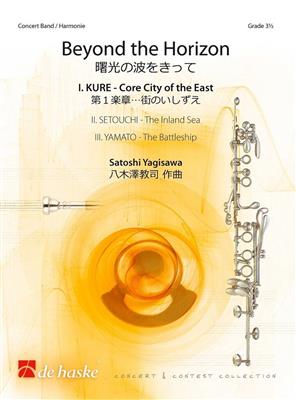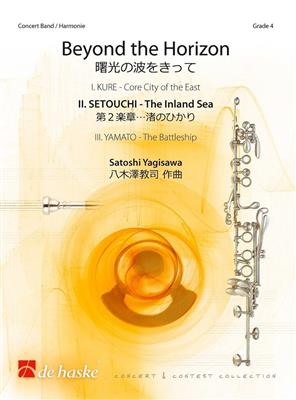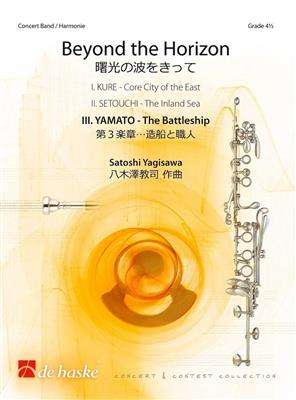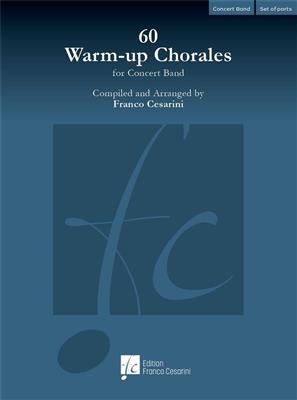Results
-
 £99.99
£99.99Beyond the Horizon - I. KURE-Core City of the East - Satoshi Yagisawa
Beyond the Horizon is available in three separate movements that each can be played independently, but also link up with each other perfectly to form a rounded whole. Thus it is possible to perform the complete three-movement work, but you can also choose to play one of the movements. The first movement, 'Kure', describes the lively Japanese city of the same name and its surroundings. Movement two, 'Setouchi', reflects the local inland sea. The third movement, 'Yamato', is all about the battleship that was built at the naval shipyard of Kure. Three expressive pieces of music full of atmosphere!DHP 1256483-010 - I. KURE - Core City of the EastDHP 1256484-010 - II. SETOUCHI - The Inland SeaDHP 1256485-010 - III. YAMATO - The Battleship
Estimated dispatch 7-14 working days
-
 £68.99
£68.99Beyond the Horizon - II. SETOUCHI-The Inland Sea - Satoshi Yagisawa
Beyond the Horizon is available in three separate movements that each can be played independently, but also link up with each other perfectly to form a rounded whole. Thus it is possible to perform the complete three-movement work, but you can also choose to play one of the movements. The first movement, 'Kure', describes the lively Japanese city of the same name and its surroundings. Movement two, 'Setouchi', reflects the local inland sea. The third movement, 'Yamato', is all about the battleship that was built at the naval shipyard of Kure. Three expressive pieces of music full of atmosphere!DHP 1256483-010 - I. KURE - Core City of the EastDHP 1256484-010 - II. SETOUCHI - The Inland SeaDHP 1256485-010 - III. YAMATO - The Battleship
Estimated dispatch 7-14 working days
-
 £114.99
£114.99Beyond the Horizon - III. YAMATO-The Battleship - Satoshi Yagisawa
Beyond the Horizon is available in three separate movements that each can be played independently, but also link up with each other perfectly to form a rounded whole. Thus it is possible to perform the complete three-movement work, but you can also choose to play one of the movements. The first movement, 'Kure', describes the lively Japanese city of the same name and its surroundings. Movement two, 'Setouchi', reflects the local inland sea. The third movement, 'Yamato', is all about the battleship that was built at the naval shipyard of Kure. Three expressive pieces of music full of atmosphere!DHP 1256483-010 - I. KURE - Core City of the EastDHP 1256484-010 - II. SETOUCHI - The Inland SeaDHP 1256485-010 - III. YAMATO - The Battleship
Estimated dispatch 7-14 working days
-
 £139.00
£139.00Me and Mrs. Jones - Kenneth Gamble
Me and Mrs. Jones was written by Kenny Gamble, Leon Huff and Cary Gilbert in 1972, and was first recorded by Billy Paul on the album 360 Degrees of Billy Paul. The song is about a man who has an affair with Mrs. Jones, and how the two secretly meet every day in the same cafe, even though they may know it's not quite right: "We got a thing going on/we both know that it's wrong/but it's much too strong/to let it go now." Paul has stated that he was sure the song was going to be a hit even before it was released, as "it's a song everyone can relate to", but already from the start the lyrics were considered somewhat controversial and the song were banned from several radio stations. Nevertheless, it became one of the best-selling singles of 1972 and Paul received a Grammy for Best Male R&B Vocal Performance.Well known is also Michael Bubl's version of the song, released on the album Call Me Irresponsible in 2007. It is his version that has been the inspiration for this arrangement, which brings out even more of the jazz elements Bubl has found in the song. The arrangement is quite demanding for the ensemble, and requires great rhythmic precision in particular.
Estimated dispatch 7-14 working days
-
 £118.99
£118.99Princess Mononoke, Medley - Joe Hisaishi
Series: New Sounds in Brass (NSB); Duration: approx.8'50"; Composed by Joe Hisaishi; Arranged by Takashi Hoshide. Arranger Takashi Hoshide says, "I have selected beautiful melodies from the soundtrack of 'Princess Mononoke' (1997, directed by Hayao Miyazaki) and arranged them into a medley. What can be said about these songs as a whole is that they combine a grand continental scale with the delicacy that reflects Japanese emotions. Since there are no upbeat songs in this selection, I had to work hard on the arrangement, but this allowed for creating contrasts and transitions between each scene in the performance. 'Ashitaka Sekki (English title: The Legend of Ashitaka)' - 'Sekki' means a story that is not recorded but passed down orally. In this anime, this can be considered a sub-main theme. The song starts with a feeling that the story is about to begin and, once the theme kicks in, aim for a grand performance to convey its scale. 'Encounter' - This is the music that plays during the scene where the protagonist Ashitaka meets San. Interestingly, the motif of the main theme 'Princess Mononoke' is used in this melody. Here, let's pursue the shifts in the timbre of individual phrases, creating a beautiful and aesthetic soundscape. 'Princess Mononoke' - This is the main title of the anime. The melody line is carried by horns and trumpets."
Estimated dispatch 7-14 working days
-
 £228.70
£228.70The Music of Antonio Carlos Jobim - Antonio Carlos Jobim
ivind Westby has written a number of excellent but demanding instrumental arrangements for Concert Band. In the present one, he has transcribed five of the most famous by Antonio Carlos Jobim. Brazilian composer Antonio Carlos Jobim (1927-1994) grew up near Ipanema, the famous beach in Rio de Janeiro. His big break through and most creative period came in the 50's and 60's which gave him the status as the greatest Brazilian composer of all times. Together with Stan Getz and Jo�o and Astrud Gilberto he recorded one of the best selling jazz-albums of all times, an album which feature several of his most famous compositions. His inspiration includes another Brazilian great; Pixinguinha, but also classical composers like Frederick Chopin and Claude Debussy. He died in NYC in 1994 after composing approx. 400 works. He is recognized all over the world as one of the most influential composers of the 20th century.
Estimated dispatch 7-14 working days
-
 £171.00
£171.00Passacaglia and Fugue in C-minor BWV 582 - Johann Sebastian Bach
The Passacaglia is a set of instrumental variations based on an ostinato bass. Bach's Passacaglia and Fugue in C-minor for organ represents the pinnacle of what had been achieved in this compositional form at that time. In Franco Cesarini's arrangement for large wind orchestra, the particularly careful interpretation of the original piece enables him to exploit all the sound colors at his disposal, and in this sumptuous guise Bach's work also takes on a grandiose dimension, albeit tinged with late-Romanticism. The exposition of the beautiful theme begins in the bass part, immediately creating a solemn and serious atmosphere which is accentuated by the intensely pathetic character of the first variations. Up to the tenth variation it remains confined to the bass, but in subsequent ones it also passes to the soprano and alto register. The integrity of the theme is also embellished with elegant arpeggios, in whose lower and higher extensions the theme can be distinguished. Towards the end it returns to the bass in an impressive thickening of the polyphonic texture that swiftly re-establishes the key of C-minor. The "Thema fugatum" which follows immediately does not constitute a Fugue in its own right, rather it is nothing but the twenty-first and most extensive variation of the Passacaglia. This time Bach uses only the first half of the theme, superimposing a rhythmic countersubject that considerably enlivens the entire development of the composition. The polyphonic discourse becomes increasingly dense, until the building tension peaks in a powerful "Neapolitan sixth" chord, followed by a sudden pause. This culminating moment then leads to the coda and final cadence on a bright C-major chord.
Estimated dispatch 7-14 working days
-
 £163.00
£163.0060 Warm-up Chorales for Concert Band
During his experience as a band conductor and teacher of wind orchestra conducting at university, Franco Cesarini has dealt with the topic of warm-ups very frequently. Throughout these long years of conducting he has had the opportunity to try many existing methods, evaluating their advantages and disadvantages.After a long time, he has decided to compile a collection of chorales for warm-ups, which are organized according to the criteria that he considers most effective.While working on his60 Warm-up Chorales for Concert Band, Franco Cesarini has always borne in mind that amateur musicians play for pleasure.He feels that it is extremely important that they have satisfaction at every moment of the rehearsal and not to start the rehearsal with needless "punishing" exercises. Nobody is really motivated to start playing with scales, long notes, or tricky rhythmical exercises. There is often a distinguished absentee in band rehearsals, namely music itself!Although this publication does not foresee a specific tempo for the chorales, they should often be performed rather slowly but without dragging.Dynamics are not indicated, so that the conductor has the opportunity to draw the attention of the musicians to his gestures and to make them react according to his indications.Timpani and bell parts have been added with the aim of not leaving the percussionists completely inactive during the warm-up phase, but can also be omitted.The chorales are written in four parts (SATB) and are also playable in smaller groups. The four voices can be played in different combinations of woodwinds or brass quartets or in mixed combinations.The collection includes ten chorales for the following keys: D flat major, A flat major, E flat major, B flat major, F major and C major.With his 60 Warm-up Chorales Franco Cesarini would like to convey the message to play the chorales in a musical way, thus raising the musicians' awareness of phrasing, the right interpretation of cadences, rubato and agogic.Above all, never do anything without putting the musical aspect in the foreground. 60 Warm-up Chorales for Concert Band: A perfect collection to warm-up and improve tuning of a concert band!
Estimated dispatch 7-14 working days
-
 £127.00
£127.00Ray of Light - Kevin Houben
Ray of light was composed for the 75th anniversary of the Royal Wind Band (De Heidegalm Berkenbos). The mining environment of Berkenbos (Heusden-Zolder, B) is a proof of what used to be one of the most flourishing industries inLimburg viz. the Mining Industry. Going down the shaft in the elevator for the first time was a sensational experience for every miner: the noise of the closing doors, the shock experienced when the lift cage started moving tofall down whizzingly into the deep at a speed of 30 km an hour. The opening theme of Ray of Light doesn't only reflect the bravery of the descending miners but also their anxiety, their doubt and insecurity. In the solo passage,the anxiety during the long walk in the dark through the mine corridors with only headlamps and mine lamps is clearly audible. Working in the mines wasn't without any danger. The very flammable and at times explosive mine gasesalways posed a hidden threat. Apart from that there was always the continuous danger of collapse. The beautiful choral movements are therefore an ode to the miners that left their lives in the mine. The eastern scale refers tothe multicultural character of the mining environment of Berkenbos with its many commercial shops and different types of housing inherent in mining architecture. The mining profession is still a very dangerous job, but at the endof the dark corridor the miners still see a beam of light as a sign of hope.
Estimated dispatch 7-14 working days
-
 £91.99
£91.99Step by Step - Philip Sparke
Step by Step was commissioned by the Sony Concert Band to celebrate their 60th anniversary in 2018. Step by Step is an up-tempo concert march. The title was chosen as it has obvious associations with marching but also as a salute to the constant improvement and development that makes the products of Sony Corporation famous around the world. Step by Step was commissioned by the Sony Concert Band to celebrate their 60th anniversary in 2018. Step by Step is an up-tempo concert march. The title was chosen as it has obvious associations with marching but also as a salute to the constant improvement and development that makes the products of Sony Corporationfamous around the world.
Estimated dispatch 7-14 working days
